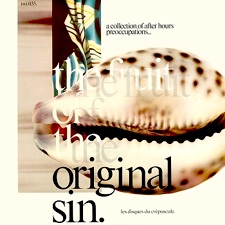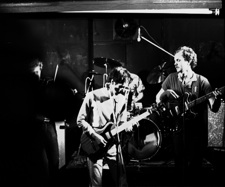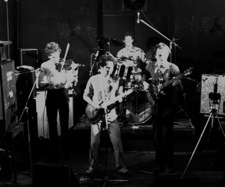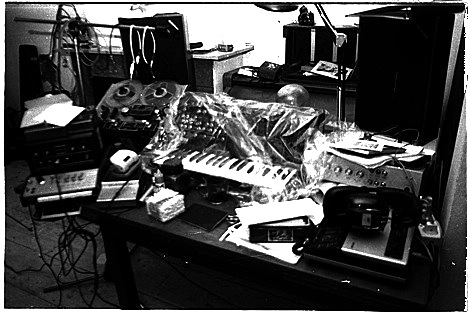Thinking can be Fun!
december 31, 2008.
 A
couple of months ago LTM
Publishing's James Nice sent me a copy of the digitally re-mastered
and enhanced double-CD edition of
The
Fruit of the Original Sin
A
couple of months ago LTM
Publishing's James Nice sent me a copy of the digitally re-mastered
and enhanced double-CD edition of
The
Fruit of the Original Sin,
a compilation that was originally put together and released in 1981 by the
Brussels based label Les
Disques du Crepuscule. It came with a small, but nevertheless appreciated,
royalties payment for "Affectionate Silence", one of the tracks on the album.
Surely, had James not contacted me, I would not have been aware of the track's re-release. The original vinyl record
would have remained standing alongside other vinyl compilations that I
contributed to in the early 1980s (and then over the years forgot about), neither touched nor played, waiting for some reason to be remembered.
It was a pleasure to re-discover Michel Duval's selection of 1981 'after hours preoccupations' on this carefully packaged edition by LTM (the label is specializing in the Crepuscule and Factory style of post-punk pop), which I found a feast for the eye and the ear, really. But for lack of time it stayed on my desk, as part of the pile of other CDs that I received in the mail or in hand this year and about which I wanted to write something at some point.
I took them with me for Christmas and the days after, to Amsterdam, and from Amsterdam to Maastricht; and then again from Maastricht to Amsterdam.
And I listened ...
 Let me begin with a few lines on Donation's
CD Nouveau chemin de guerre,
freshly released earlier this year, but surely not the easiest of 2008's
releases to get your hands on. Donation is the french musician
Mathias Dufil's moniker. Mathias gave me a copy of his album on
an autumn evening earlier this year, when we both performed at La Miroiterie.
That was on september 10th, as part of a 'Found Footage' event organized
there by Julien,
formerly of La Veilleuse.
Let me begin with a few lines on Donation's
CD Nouveau chemin de guerre,
freshly released earlier this year, but surely not the easiest of 2008's
releases to get your hands on. Donation is the french musician
Mathias Dufil's moniker. Mathias gave me a copy of his album on
an autumn evening earlier this year, when we both performed at La Miroiterie.
That was on september 10th, as part of a 'Found Footage' event organized
there by Julien,
formerly of La Veilleuse.
If I remember rightly, for his contribution to the evening Mathias mainly
mixed field recordings from CD,
mini disc, also from tape maybe, into a noisy ensemble; maybe leading them
through a couple of effect machines, maybe not. I do not recall it in detail,
which - I guess - means that it must have been pretty much the, eh, well
... the 'usual thing'.
When some days after the Miroiterie evening I listened to Mathias' CD, however, this turned out to be radically different from what I had expected. That was a surprise: I found myself listening to a song-singer, strumming an acoustic guitar to accompany the somewhat plaintive rendering of mostly slow paced songs, in a bitter-sweet melancholic french.
I like to be surprised. To come across something that manages to drastically dis-confirm
earlier formed opinions.
It did not happen an awful lot this year ...
The more reason for me to enjoy Nouveau chemin de guerre.
I did play the record regularly over the past couple
of months.
And that, of course, is interesting.
For it set me thinking. And
thinking can be fun!
First there is the fact that Mathias tracks made me realize that at heart his 'traditional' singing and guitar playing actually were far more 'radical' than his noisy sound collage at la Miroiterie. This is partly a matter of context: when after having listened to 99 'experimental' and self-proclaimed 'other_music-ians' - most of which (unfortunately there is no denying) create pretty much interchangeable sound fields by maltreating in pretty much interchangeable and derivative manners old (of course) instruments, using cheap electronics and feeding back whatever can be fed back - there comes a 100th who picks up an acoustic guitar, tunes it and then sings a song ... then of course it is the (s)he who starts the song-singing that deviates from the norm and does the adventurous and risky bit ...
On second hearing, also, there is more to the record than just folksy guitar
playing and singing. The record actually uses a lot of field recordings
that are mixed in with the songs, and there is a nice drony track (Seule)
where Mathias' ritualistic chanting is accompanied by a steady
organ tone, a percussive rattling shake and sparse drumming. The abundantly
used field recordings are not in there as mere 'sound effects'. They rather
act as a separate voice, or instrument, like the (maybe over-obvious, but
effective) pastoral birdsong in the instrumental Françoise. Sometimes
the long recordings with people laughing, talking, chit-chatting - inside,
in a bar or discotheque with loud music playing (Le Temps), or
outside, eating (?), again with birds singing; or is that a separate recording?
(Les Odeurs) - form the main voice. They suggest 'stories'
involving those that were recorded, and the ensemble forces the
listener to relate these to the 'stories' told by the lyrics of the songs.
This gives the album a nice cinematographic quality. It feels
like documentary; it sounds like autobiography.
So I'm pretty content with my copy of Donation's CD.
On the other hand: would my enthusiastic (over?-)reaction to Nouveau
chemin de guerre not be related to the fact that, while writing
entries to this very SoundBlog or otherwise working, all along
this year my laptop's iTunes has been playing me an awful lot of Mountain
Goats, especially the early lo-fi boombox-recorded records, that I 'discovered'
by accident less than a year ago, while pretty much random surfing some
LastFM playlists ?
It is certainly true that, notwithstanding my lasting passion for pure sound
and free improvisation, these past couple of years I have come across
too many simply bad or mediocre performances
being passed off as 'noise' or 'experimental', and looking back on the year, indeed
my best concert memories (as part of the audience, that is)
are of those couple of occasions where the band was just up there having
fuck-all fun. Like when Rhys
Chatham did his Guitar Trio at the Studio Campus, or when the Stig
Noise Sound System were jumping all over la Miroiterie ...
Should I "pick up my guitar and play, just like yesterday" ? ( * )
 |
 |
The track that I contributed to the Crepuscule compilation - Affectionate Silence - dates from early 1981. It was among the last of the many 'traditional' (that is, with a rock band format in mind) songs that I wrote and demo-recorded in Amsterdam between about 1978 and 1981, and performed with a band that went by the somewhat frivolous name of 'Presse Papier'. The photographs above were taken by fPcM, during what must have been one of the, or maybe even the, last live performance of the four-piece ( ** ), in Oktopus on the Keizersgracht in Amsterdam, sometime 1980. Shortly after I disbanded the band as a live group.
Maybe even more so than today's, these were over-active times. I was organizing
concerts and things at the Amsterdam Oktopus youth center, performing and
recording with The
Young Lions, doing live 'post punk experimental pop' duo performances
as The Side (with Wijnand de Groot), was deeply involved in YL-related
recording projects as divers as the Dokterromannetjes
(with Ronald Heiloo) and Signs
& Symptoms (with fPcM), obsessed by 'experiments' of any sort, and
- probably unrightly so - convinced that the (more or less) traditional
rock group format was far too restrictive for 'what I really wanted
to do'.
'Presse Papier' continued for a while as a recording project, though. I would tape hours and hours of Gerrit and Mick playing
unaccompanied drums and bass, onto Wijnand's 4-track TEAC.
I then worked on top of these recordings.
Usually that work started at home, using sound-on-sound to make a monophonic demo on a reel-to-reel machine (see the photograph below). Next I re-did the recording on the 4-track machine in our rehearsal studio, to produce a stereo-demo.
That was how Affectionate Silence was done. On the Crepuscule compilation
it is credited not to 'Presse Papier', but to '323'. I
actually was at a loss for a proper name, and used '323' because we were
rehearsing and recording in a basement at number 323 in the Marnixstraat
in Amsterdam, a place that we rented from a peace and music loving hippie
girl teaching yoga classes and that we shared with the Young
Lions and the Minny
Pops.
The
Fruit of the Original Sin
will probably continue to make me think of Christmas for the rest of my days.
Not because now it's that time of the year, but rather because those very early 1980s to me feel as
if it were Christmas all the time.
Would that be because almost all of my memories, like the pictures from that time, seem to be in black-and-white?
 |
Much of what happened back then I can not easily reconstitute with much precision. It is a long time ago, and apart from precisely 45 pages handwritten between december 11th, 1980 and march 21st, 1981 (which for the most part are copies of letters I wrote) I have no journals left from the time. Just a few agenda's, but these I only used sparingly. The most reliable chronology actually is that of the recordings, which fill dozens of boxes of reel-to-reel tape. These show, for example, that I did at least three versions of the Affectionate Silence stereo demo early 1981. The first is from the 18th of february, the second from the 11th of march, and the third one is dated march 16th. That was not unusual. I never was satisfied, and continued to re-do mixes all the time. In one of the letters that I wrote at the time I tell a friend that I daily spent between 12 and 14 hours in the 323 basement. I don't think that was exaggerated.
And all that time was Christmas time.
Affectionate Silence was part of an ambitious series of songs,
that together were to constitute an even more ambitious album. A thing with
a 'concept'. I wanted it to be both personal and abstract, to be rooted
in the indie rock of its days, but it also was to take a step beyond. In hindsight,
it would certainly have been imbued with quite some imminent
doom and disaster. For such were the spirits of its time ... I was imagining
an album with the feel of a Fassbinder
movie. Indeed, at the time I too had a bad 'case of Deutsche Angst', as
it is so nicely phrased in one of the additional tracks on the CD re-edition
of The
Fruit of the Original Sin,
a piece by Lawrence Weiner and Peter Gordon.
Here is what I wrote about it in a letter dated february 15th, 1980:
"I've been working for quite a while now on a series of songs describing things done and thought by a 'she'-person. At first I thought that was because I did not want to be writing about myself. But of course one soon discovers that it doesn't make a difference: one continues to write about oneself ... It'll be something dark and depressing. Maybe it'll make me feel modern ..."
I remain pleased with the lyrics (of which the words to Affectionate Silence are an example), as I do like most of the sketches for the songs. As sketches; the 'imagined album', as you probably will have guessed, was never made.
Easter of 1981 I moved from Amsterdam to London.
It was because I was in love. But it was also because I presumed - and probably rightly so - that London was the better place to be for doing anglophonic indie-postpunk in the very early 1980s. It is therefore somewhat ironical maybe that of all the independent record labels that I contacted by sending them demo recordings of tracks to be on my 'imagined album', it was Michel Duval of the Brussels based Les Disques du Crepuscule who got back to me, immediately and enthusiastically.
But of course I was happy about that. Very much so.
I had liked 'From Brussels With Love' a lot, the nicely packaged cassette compilation release from november 1980 which had 'put Crepuscule on the map'. 'From Brussels With Love' was an audio magazine, really, which combined contributions from (mostly british) post-punk experimentalists, work by minimalist composers like Gavin Bryars and Michel Nyman, interviews (with Brian Eno, with Jeanne Moreau), and Richard Jobson reading poetry, with a stylish touch of French melancholy, epitomized by Erik Satie's music and Marguerite Duras' writings and movies. Les Disques du Crepuscule had the sort of romantic intellectual chic appeal that I - then, and maybe still? - could very much relate to.
It felt cold and dark, in a comfortable way. It felt like Christmas. It was the way that in 1981 we 'did' London ... Starving, for sure. But that was rather because we choose to. Much of the day I would stay in our crepuscular and absolutely bare Bayswater room, typing lines of lyrics on a portable typewriter, then applying burroughsian cut-ups to the result, and re-ordering these cut-ups to type them out again ... Or I sound-on-sound recorded demos of songs and sound-collages on my Revox reel-to-reel machine (one of the few 'only-the-strictly-essential-possessions' that I had brought with me from Amsterdam), often cutting up the tapes like I cut up the texts. In the evenings I read - but while in London I did not read English books; I read Thomas Mann (Der Zauberberg and Doktor Faustus, both in German) and Marguerite Duras (l'Amour, in French, which at the time I actually did not understand one bit; but that did not matter, because - as I used to say - I read l'Amour 'for the music'). On other evenings we spent the little money we had to watch Humphrey Bogart movies in an all-night cinema on Portobello Road, or to hang out at Richard Strange's Cabaret Futura in Wardour Street.
Michel adored Affectionate Silence, he told me in the blue typewritten
Crepuscule letters that I received in London (always signing off with "from Brussels,
city of despair"...) So
that is how eventually the stereo demo got included on
The
Fruit of the Original Sin,
the double vinyl that was to be the follow-up to 'From Brussels With Love'.
Better still was that Crepuscule seemed to be eager to follow-up
on the recording project. It was Michel who, in another one of the blue
letters from 'the city of despair' proposed to start with an album, as he
thought that would be better strategy than a single or EP. It must have been some time
in the early summer of 1981 that we began discussing recording time in a Brussels' studio at the end of that year, in december.
But five or six months in 1981 ... that was something of a life time.
I met Michel Duval and Annik Honoré a couple of times in Brussels, probably late summer. It always was evening. It was always like Christmas. We talked about music, about the album we would do and about some of the other plans Michel and Annik had for and with Crepuscule, like, if I remember well, something fashion and clothes related.
Summer passed, and the world became an even weirder place.
Michel by then had invited me to contribute a track to yet another Crepuscule compilation: a vinyl album that was to be released for Christmas 1981. "Ghosts of Christmas Past" its title would be, and all songs were to be related to Christmas, in one way or another.
So it came about that in the London of september 1981 I wrote and recorded a Christmas song. It was my first chanson de Noël, and most probably will remain the only one. If nothing else, it is surely among the most curious recordings I ever did. "Furtive tears" (as the track is called) is a ragged paste-up of disparate, not quite fitting, but yet connected, elements. Each, in a way, refers to something that I saw as 'typically Crepuscule': there is the out-of-tune upright piano, 'jazzy' guitar licks, tape-loops, a guitar-riff that reverberates in an almost Durutti Column-ish manner, a voice that melodramatically sing-recites the song's lyrics (which must have been in part inspired by Diane Arbus's well-known 1962 picture of a child with a toy hand grenade in Central Park ( **** )) ... I think the track is an amazing 'exercice de style'; I especially like the way in which all of its elements come together in an almost-but-not-quite fit ...
I recorded "Furtive Tears" with much help and kindness of my London friends Helga Byrne (singing like angels) and Tom Astor (playing the bass), on Tom's 4-track reel-to-reel machine in the basement of his parents' residence, next door to Paul McCartney's mansion in St. John's Wood.
"Furtive Tears" never made it onto the record, though. I sent Michel the master tape, only just in time for the Christmas compilation's dead-line. But he then later told me that the tape had been impossible to play. Or that it drowned in hiss. Or whatever. Maybe it did. Or maybe it was just an excuse. Maybe Michel simply didn't like the track. Maybe he stopped liking me. I do not know. I cannot remember whether I ever had the chance to ask him. I also cannot remember whether we ever met in person again, and I do not recall how it came about that in the end the imagined album for Crepuscule never got produced.
So here's to a genuine 'ghost from Christmas past' ... Happy New Year!
[ On this festive occasion, as ![]() this SB entry's podcast you can listen to
and/or download right here and right now the complete and unabridged recording of "Furtive Tears", all the way
from 1981 ... Enjoy! ]
this SB entry's podcast you can listen to
and/or download right here and right now the complete and unabridged recording of "Furtive Tears", all the way
from 1981 ... Enjoy! ]
notes __ ::
(*) From the lyrics to The Who's song 'Won't
get fooled again', from 1971; a track remarkable for its early use
of a synthesizer to rhythmically modify the sound of the organ
by voltage-controlled filtering. [
^ ]
(**) Apart from myself singing and playing the guitar, there's Wijnand de Groot on violin, Gerrit Bos on drums and
Mick Deutz on bass. [
^ ]
(***) AFFECTIONATE SILENCE (1981) :: 'She asked him with her eyes, and
he asked her. Getting up on cold mornings all she felt was the physical pleasure of going through
gestures sufficient onto themselves, a mechanical way to recall affectionate silence: it could
mean contentment, it could be peace. She feared spiders more than Germans, had a hell of a time
with the spelling of names, and vaguely she knew she was out of connection, sitting silent for
hours at the night of the dance she could always hear his voice talking when the room was
crowded and watch him ...' [ ^ ]
(****) FURTIVE TEARS (1981) :: 'Hearts leap up
in pure cool air, amid the noise and glitter of Joy! among the crowds, aimless
motion in easy trod, like angels dance (or so it seems), caper, wagging
their hips, burn sacred fire ... Hands reach out, untouchable skies, love-lust
in private life. Fear and furtive tears where soldiers march, like
angels dance, whimpering in disbelief: "The child is waving a hand grenade
!" ...' [ ^ ]
tags: post punk, Amsterdam, London, Brussels, Crepuscule
# .288.
comments for Thinking can be Fun! ::
|
Comments are disabled |